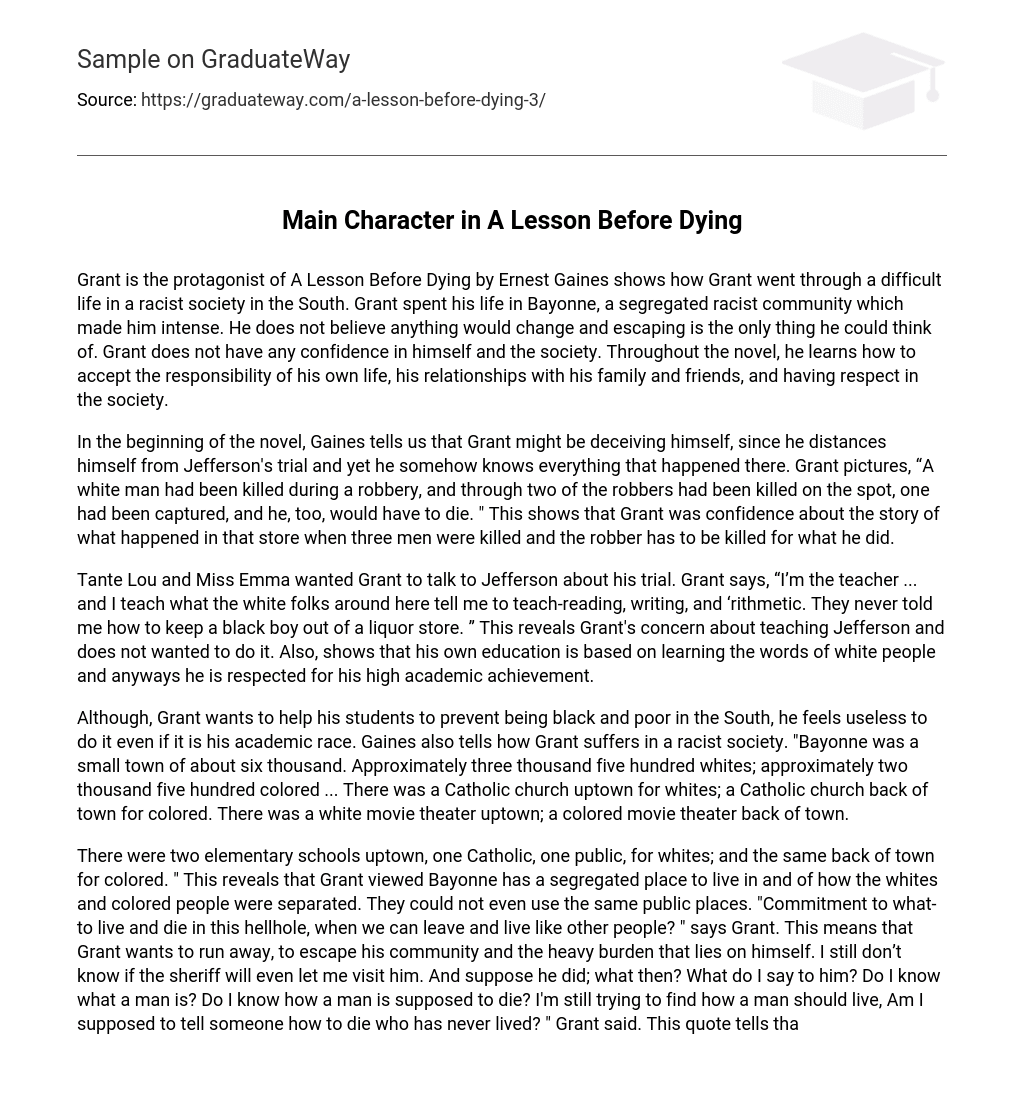Grant, the protagonist of A Lesson Before Dying by Ernest Gaines, demonstrates the challenges he faces in a racist society in the South. Growing up in the segregated and prejudice community of Bayonne, Grant’s experiences have made him become deeply frustrated. He has lost faith in the possibility of change and can only consider escape as a solution. Both his own self-confidence and belief in society have faltered. However, as the novel progresses, Grant learns and accepts the importance of taking control of his own life, fostering meaningful relationships with his family and friends, and earning respect within society.
In the opening of the novel, Gaines suggests that Grant may be fooling himself by appearing detached from Jefferson’s trial while still possessing full knowledge of its events. Grant visualizes the scene: “A white man had been killed during a robbery, and despite two of the robbers dying on the scene, one was apprehended and faced imminent death.” This displays Grant’s certainty regarding the narrative surrounding the incident at the store, where three men were fatally shot and the perpetrator must face fatal consequences for his actions.
Tante Lou and Miss Emma urged Grant to have a conversation with Jefferson regarding his trial. Grant acknowledges, “I am the teacher …” and feels obligated to teach what the white community expects of him – reading, writing, and arithmetic. However, he has not been taught how to prevent a black boy from entering a liquor store. Grant’s statement demonstrates his apprehension towards instructing Jefferson. It also highlights that his own education primarily consists of acquiring the words of white individuals. Nevertheless, Grant is esteemed for his impressive educational accomplishments.
Grant desires to assist his students in avoiding a life of poverty and discrimination in the South. However, he is burdened with feelings of helplessness due to the pervasive racism he witnesses. Gaines illustrates this through the contrasting environments of Bayonne, a small town with approximately three thousand five hundred white residents and two thousand five hundred colored residents. The segregated facilities, such as separate Catholic churches and movie theaters for whites and colored individuals, further exemplify the racial divide in society.
The passage uncovers Grant’s perspective on Bayonne as a segregated place, where separate elementary schools exist for white and colored individuals. Even public spaces are divided between the two groups. Grant expresses his longing to escape this community and the burdens it carries: “Why should we commit ourselves to living and dying in this wretched place when we have the chance to leave and live like everyone else?” He is uncertain if the sheriff will grant him permission to visit someone, and even if he does, Grant wonders what he would say and whether he truly comprehends how a man should lead their life and face death: “Do I possess knowledge of what defines a man? Do I understand how one ought to die? I am still searching for guidance on how a man should live. Am I expected to instruct someone on death who has never experienced true life?” Despite his education and teaching profession, Grant confesses that he is not more enlightened about discovering purpose in life than others within the black community.
Grant initially failed to see the universality in the story mentioned by the little Irishman. He viewed it as a tale of Irishmen discussing politics in a room, unrelated to America or his own people. However, later on, he began to understand the little Irishman’s point. Grant started paying close attention to how people talked about their heroes and revered the dead, noticing this sentiment everywhere he went. The story reflects Grant’s reaction and highlights Jackie Robinson and Joe Louis’ significance within the colored community, providing hope for black individuals. Ernest Gaines also portrays Grant’s role in aiding Jefferson through facing death. Grant acknowledges historical failures of black men in protecting black women since slavery; they either endure oppression or leave, leaving women responsible for themselves and their children. Each new male child born represents hope for breaking this cycle of failure but sadly remains unrealized.
The quote indicates that the text deals with the experiences of black men in the South. They have the choice to either stay and endure mistreatment from white individuals or run away and escape their burdens. Grant, the protagonist, attempts to create a better life for himself and also supports Jefferson in coping with death.
Grant acknowledges the concept of a myth to Jefferson, explaining that it is an ancient falsehood that individuals adhere to. Specifically, he highlights how white people subscribe to the belief that they are superior to others, a myth that Grant aims to dismantle. Grant recognizes the fear white individuals possess in witnessing a black man assert his humanity and showcase his capacity for independent thought. By challenging this myth, Grant hopes to undermine the perception of himself as an enslaved individual who lacks the courage to confront white judgements. Ultimately, Grant implores Jefferson to join him in chipping away at this myth by taking a stand.
I want you – yes, you – to call them liars. I want you to show that you are even more of a man than they can ever be. That jury? Are they truly men? What about the judge? Is he a real man? The governor is no better. They adhere to the rules established by their forefathers hundreds of years ago. These forefathers believed that they were only three-fifths human – and this belief still persists… day.”
This passage conveys Grant’s comprehension of why Miss Emma desires for Jefferson to die with dignity as a man rather than like an animal. By not allowing the racist society to impact him, Jefferson has the potential to become a heroic figure.





